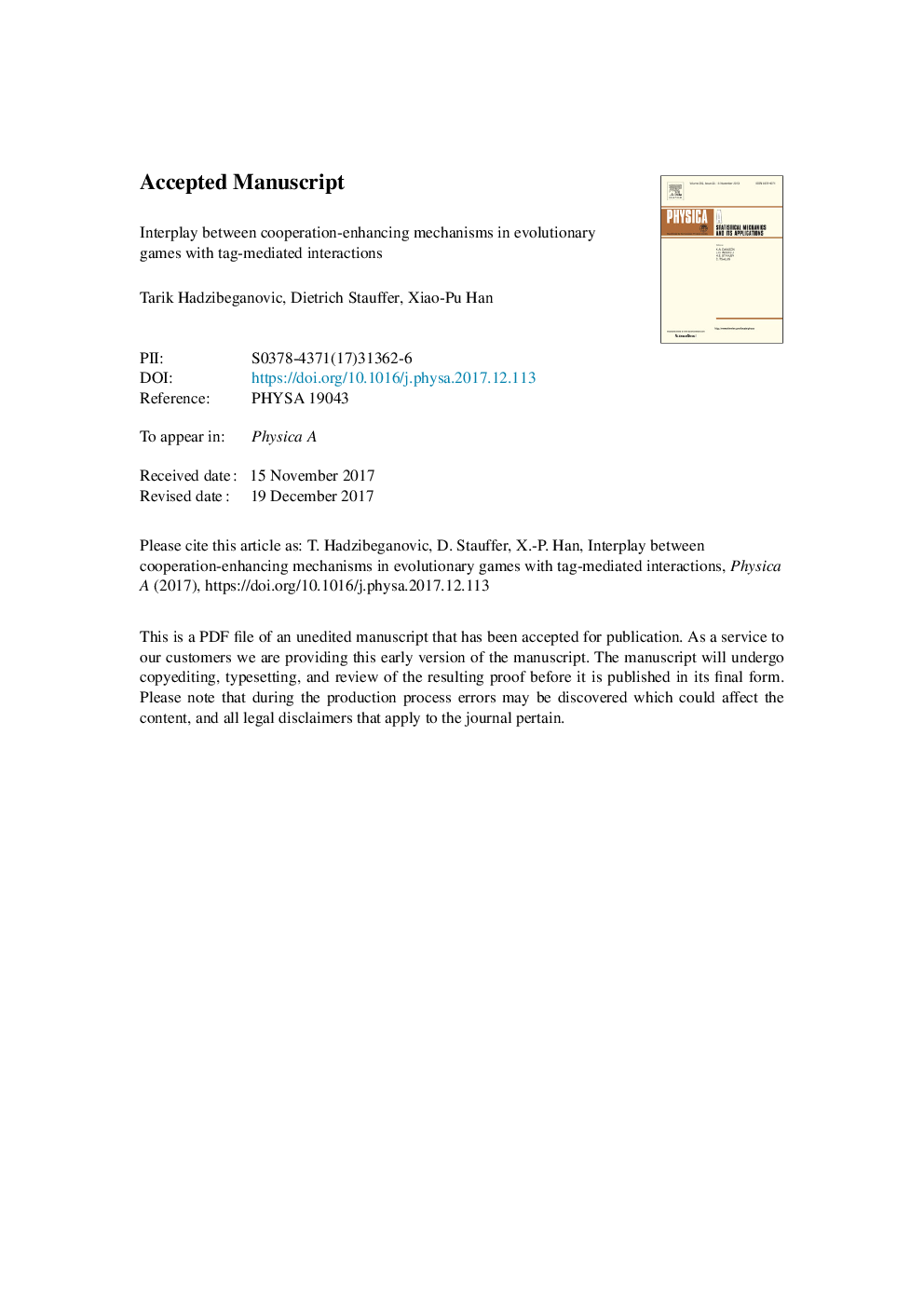ترجمه فارسی عنوان مقاله
تعامل میان ساز و کارهای تقویت همکاری در بازی های تکاملی با تعاملات متمرکز با برچسب
عنوان انگلیسی
Interplay between cooperation-enhancing mechanisms in evolutionary games with tag-mediated interactions
| کد مقاله | سال انتشار | تعداد صفحات مقاله انگلیسی |
|---|---|---|
| 126678 | 2018 | 15 صفحه PDF |
منبع

Publisher : Elsevier - Science Direct (الزویر - ساینس دایرکت)
Journal : Physica A: Statistical Mechanics and its Applications, Volume 496, 15 April 2018, Pages 676-690
ترجمه کلمات کلیدی
مدل مبتنی بر عامل، تئوری بازی تکامل شبکه های پیچیده همکاری مبتنی بر برچسب، مونت کارلو شبیه سازی، نژاد پرستی،
کلمات کلیدی انگلیسی
Agent-based model; Evolutionary game theory; Complex networks; Tag-based cooperation; Monte-Carlo simulation; Ethnocentrism;
ترجمه چکیده
همکاری برای بقای طولانی مدت شبکه های بیولوژیکی، اجتماعی و تکنولوژیکی اساسی است. پیش از این، مکانیزم هایی برای افزایش همکاری، از قبیل متقابل شبکه، به طور جدی مورد بررسی قرار گرفته اند و با یافته های غالبا غیرقابل حل بوده است. در اینجا، ما یک مدل کامپیوتری مبتنی بر تکامل، چند منظوره و مکانی صریح را ارائه می دهیم تا به طور خاص به ارتباط متقابل تعاملی بین چنین سازوکارها اشاره شود. ما سیستماتیک بررسی اثرات تنوع فنوتیپی، ساختار شبکه و پاداش ها بر رفتار تعاونی در جامعه ای از بازتولید کننده تصمیم گیرندگان مصنوعی که بازی های تکاملی مداخله گره را بازی می کنند، بررسی می کنیم. تعاملات تعاونی پاداش داده می شود به طوری که هر دو مزایای دریافت کنندگان و هزینه های اهدا کنندگان تحت تاثیر میزان پاداش قرار می گیرند. مبلغ پاداش به وسیله تعداد اعمال تعاونی در یک دوره زمانی پاداش داده شده تعیین می شود. آزمایش های محاسباتی ما نشان می دهد که فریم های پاداش کوچک همکاری بی قید و شرطی را در جمعیت هایی با تنوع کم و زیاد به وجود می آورند، در حالی که فریم های پاداش های بزرگ منجر به چرخه های استراتژی های شرطی و بدون قید و شرط در تنوع زیاد، اما نه کم است. علاوه بر این، تعامل بین پاداش ها و ساختار فضایی نشان می دهد که در مقایسه با فریم های پاداش کوچک، تفاوت زیادی بین فرکانس مشارکتکنندگان مشروط در پرورش شبکه های مجاور و غیر مجازی وجود دارد زمانی که قاب پاداش بزرگ است. به طور مشخص، در یک جمعیت کمتر تنوع، تعداد کل نقص در مقایسه با توپولوژی های مختلف شبکه قابل مقایسه است، در حالی که در محیط های متنوع تر، نقص ها در یک شبکه منظم ساختاری نسبت به یک شبکه کوچک از شبکه های کوچک مجازی، بیشتر شده است. پذیرش اهمیت چنین اثرات متقابل در معضلات اجتماعی، پیامدهای اجتناب ناپذیری برای طراحی آینده پروتکل های تقویت همکاری در سیستم های بزرگ، توزیع شده و غیر متمرکز مانند شبکه های همکار به شبکه می باشد.

